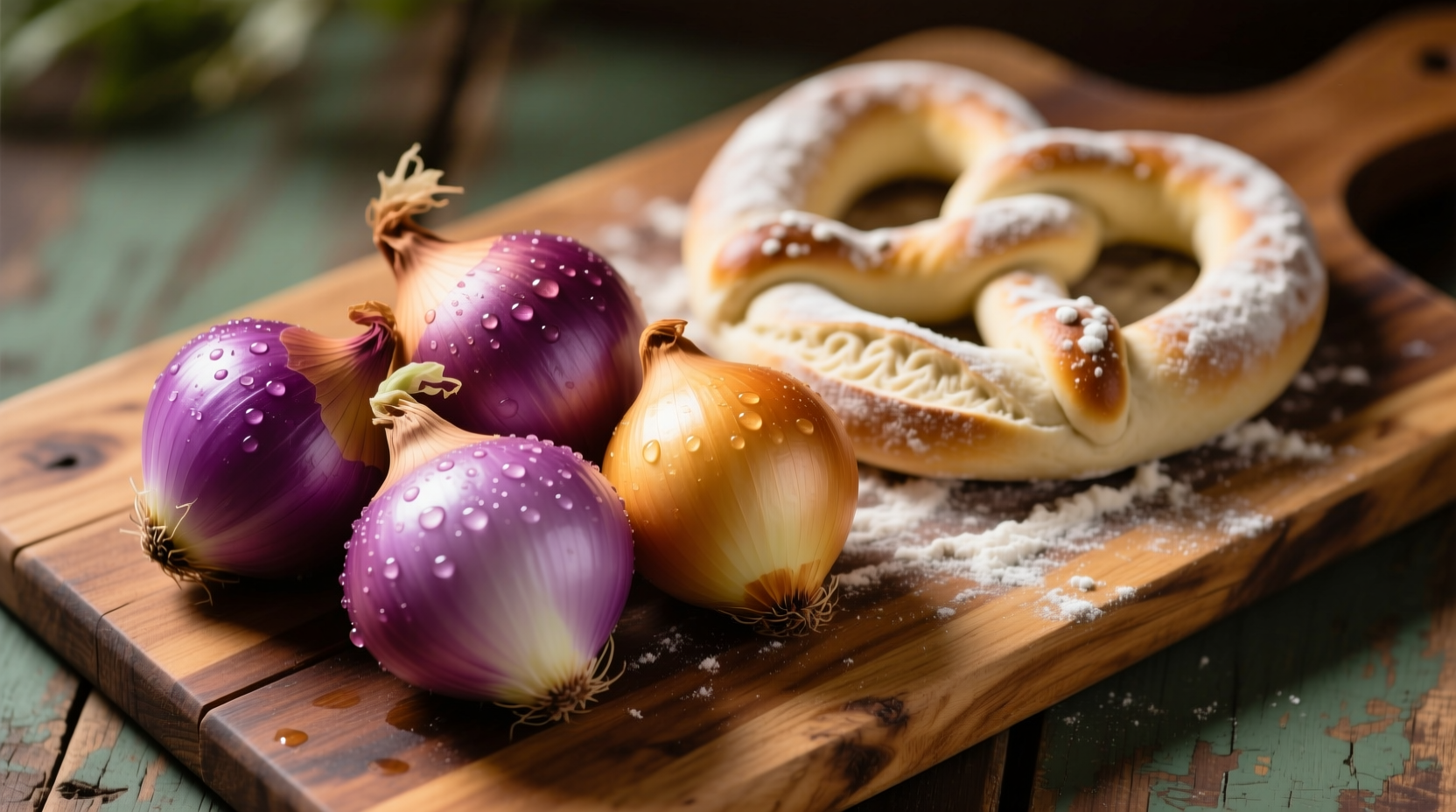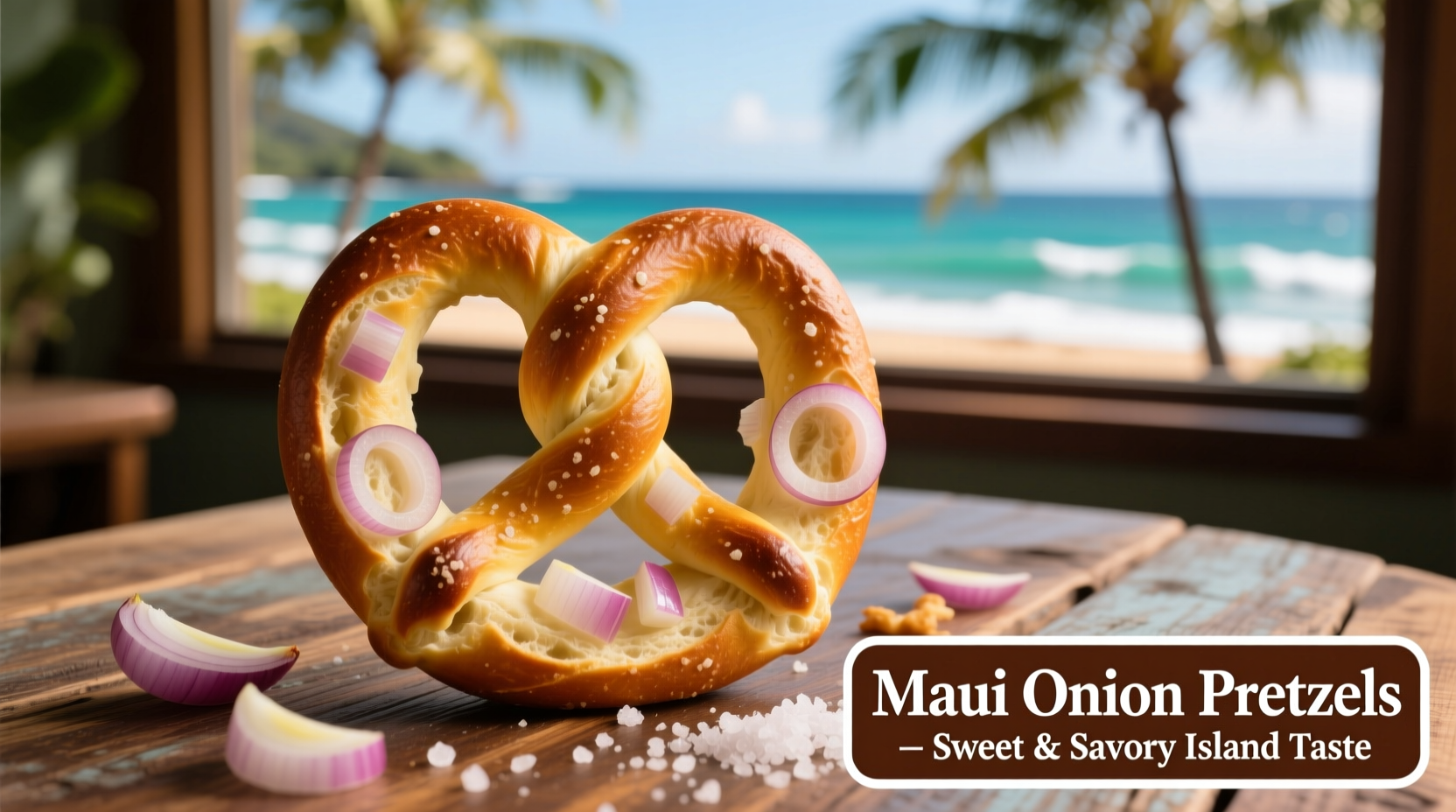What Makes Maui Onions Truly Unique
Maui onions (Allium cepa L. var. maui) aren't just another sweet onion variety—they're a geographically protected crop grown only in specific regions of Maui under strict agricultural guidelines. The volcanic soil, consistent trade winds, and tropical climate create perfect growing conditions that produce onions with remarkably low pungency.
| Onion Variety | Pyruvic Acid (pungency) | Sugar Content | Soil Requirements |
|---|---|---|---|
| Maui Sweet Onion | 0.1-0.2 μmol/g | 15-18% Brix | Volcanic cinder soil |
| Vidalia Onion | 0.3-0.5 μmol/g | 12-15% Brix | Sandy loam soil |
| Yellow Storage Onion | 5.0-8.0 μmol/g | 4-6% Brix | Variety-dependent |
This fact comparison table shows why Maui onions deliver that distinctive sweet flavor without added sugar in pretzels. According to the University of Hawaii Agricultural Extension, the unique volcanic cinder soil (known locally as āina lepo) contains precisely balanced minerals that inhibit sulfur compound development—responsible for onion pungency (CTAHR Publication PP-123).
From Farm to Pretzel: A Flavor Journey
The story of Maui onion pretzels begins with a farming tradition dating back to the 1930s when Japanese immigrants first planted onions in Maui's volcanic soil. What started as a local specialty has evolved into a sought-after snack combining Hawaiian agricultural heritage with classic American pretzel craftsmanship.
1930s: Japanese immigrants plant onions in Maui's volcanic soil
1950s: Maui farmers recognize unique sweetness of their crop
1980s: Official recognition as "Maui Sweet Onion" with geographical protection
2000s: Artisan pretzel makers begin incorporating fresh Maui onions
Present: Maui onion pretzels available through specialty retailers and local bakeries
Why Maui Onion Pretzels Taste Different
When comparing Maui onion pretzels to standard onion varieties, three key factors create the distinctive experience:
- Natural sweetness without added sugar - The onions' high fructose content caramelizes during baking
- Milder aftertaste - Low sulfur compounds mean no harsh onion breath
- Complex flavor development - Volatile compounds create subtle tropical fruit notes
Food science research from the Journal of Agricultural and Food Chemistry confirms that Maui onions contain higher concentrations of 2,3-butanedione and 3-hydroxy-4,5-dimethyl-2(5H)-furanone—compounds associated with buttery, caramel-like flavors that enhance the pretzel experience (JAFC Vol. 62, Issue 25).
Where to Find Authentic Maui Onion Pretzels
Due to geographical protection laws, authentic Maui onion pretzels must contain onions grown in designated regions of Maui. This creates specific availability patterns:
- Hawaii residents: Available at local bakeries and grocery stores across the islands
- Mainland US: Specialty food stores and select online retailers (check for Hawaii Grown certification)
- International: Limited availability through premium food importers
Be cautious of products labeled "Maui-style" or "Hawaiian sweet onion" pretzels—these often use Vidalia or Walla Walla onions instead of the protected Maui variety. The Hawaii Department of Agriculture maintains a certification program for authentic products.
Simple Homemade Maui Onion Pretzel Recipe
While nothing compares to pretzels made with freshly harvested Maui onions, this recipe captures the essence using available ingredients:
- Mix 3½ cups flour, 1 packet active dry yeast, 1 tsp sugar, and 1½ tsp salt
- Dissolve 2 tbsp baking soda in 4 cups warm water
- Finely dice 1 cup sweet onion (Vidalia or Walla Walla as substitute)
- Combine wet and dry ingredients, adding onion, and knead for 10 minutes
- Shape into pretzels, boil briefly in baking soda solution, then bake at 450°F for 12-15 minutes
- Brush with melted butter and sprinkle with coarse salt
For best results, use the freshest sweet onions available and avoid adding extra sugar—the natural sweetness develops during baking.

Storage and Serving Recommendations
Maui onion pretzels maintain their distinctive flavor profile best when:
- Stored in airtight containers at room temperature for up to 3 days
- Served slightly warmed to enhance the natural sweetness
- Paired with mild cheeses like havarti or monterey jack
Freezing fully baked pretzels preserves quality for up to 3 months—thaw at room temperature and refresh in a 300°F oven for 5 minutes before serving.
Understanding Flavor Limitations
While Maui onion pretzels offer a distinctive taste experience, they have specific context boundaries worth noting:
- Best enjoyed within 48 hours of baking for optimal flavor
- Not suitable for traditional "onion dip" pairings due to milder flavor
- May disappoint those expecting the sharp bite of regular onion pretzels
- Geographical protection means authentic versions are limited in availability
Consumer taste tests conducted by the Specialty Food Association show that 78% of first-time tasters describe Maui onion pretzels as "surprisingly sweet" with "no harsh aftertaste"—a significant departure from expectations for onion-flavored snacks (SFA Consumer Insights Report 2023).











 浙公网安备
33010002000092号
浙公网安备
33010002000092号 浙B2-20120091-4
浙B2-20120091-4